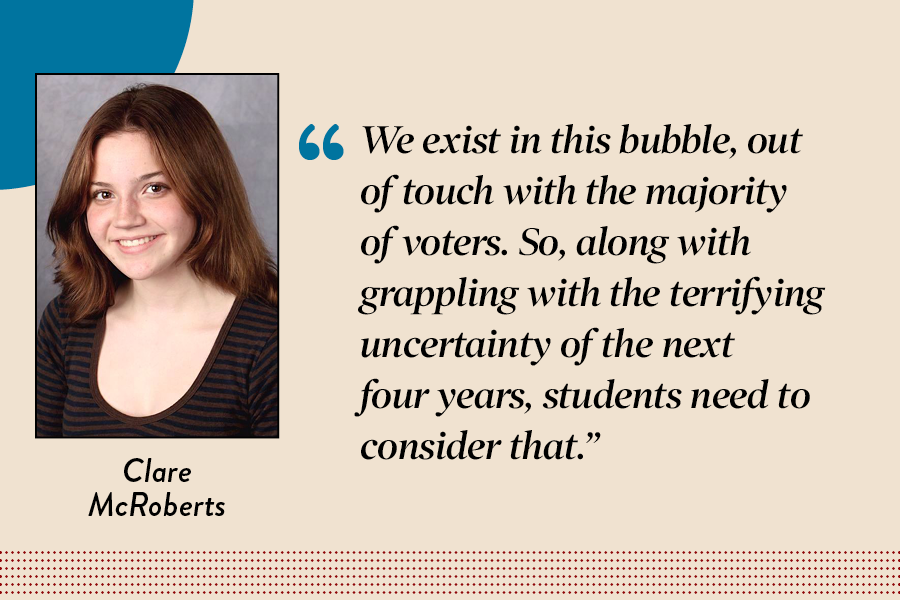At the assembly about political extremism on Oct. 24, the speaker was asked who he thought would win the election. He said Donald Trump. I remember looking around at my friends’ faces, seeing their mixed reactions: some looked astonished while others rolled their eyes or smiled nervously. The room hummed with discussion as many similar looks filled the hall.
We know what happened next.
On Nov. 6, I walked through U-High’s hallways filled with somber faces and the chatter of students expressing their surprise and fear. At a school where 91.4% of the student body voted for Kamala Harris in the Midway’s mock election, you could feel the energy shift from hopeful to stunned.
Most students at U-High — myself included — were shocked by the outcome of this election. But looking at the socioeconomic breadth of Donald Trump’s victory, we shouldn’t have been, which reflects the disconnect in our understanding of how most of this country feels.
A lot of us at U-High are deeply concerned about the fate of our democracy, the future of immigrants in this country, the state of reproductive rights and so much more. There are frightening possibilities in all of our futures that are worth being passionate — and disturbed — about.
That said, there is another message we need to walk away from this election with. Many Americans — the majority, in fact — voted for Donald Trump at least in part because of a different set of fears that people at U-High might not have thought as much about. Many were more worried about real, economic issues in their own homes, from the cost of child care to the price of eggs.
Kamala Harris’ loss reflects the Democratic Party’s neglect and disconnect from working class Americans. While historically, Democrats have been seen as the voice for middle class voters, Kamala Harris and the Joe Biden administration that preceded her clearly didn’t go far enough in outreach and appeal to working class Americans. According to exit polls analyzed by Axios, a majority of Americans without college degrees voted for Trump, while a majority of those with college degrees voted for Harris. Only 38% of Americans have college degrees.
We exist in this bubble, out of touch with the majority of voters. So, along with grappling with the terrifying uncertainty of the next four years, students need to consider that.
This election exhibits the divide between working class Americans and those without college degrees and the privileged, which includes most people at U-High. It’s a reminder to think about how we can reach outside of our bubble to understand the struggle that many voters were expressing in this election. This doesn’t mean that Trump will be anything near a unifying force of this country, but we need to lend an ear and be open to the message of pain that many voters are sending.






















































Bunnie Keen • Nov 23, 2024 at 11:39 am
So sorry for misspelling your name, Clare! As well as not noticing you are the Editor in Chief So I assume you do have the discretion concerning topics to write about. I feel like the effect of misinformation is right along side the focus of your commentary, if not even more foundational, to the problems we face going forward.
Thanks again for your fabulous article!
labliberty.com • Dec 6, 2024 at 2:50 pm
Yeah, good idea! How about a write-up about the record amounts of misinformation spread by the Harris campaign?
Bunnie Keen • Nov 23, 2024 at 11:29 am
Fabulous article Claire! I felt everything you and your classmates felt. Do you have the discretion/bandwidth to tackle real solutions for the copious amount of misinformation is/was disseminated through social media?
Labliberty.com • Nov 23, 2024 at 10:07 am
Oh my, Midway has come to their senses. Yes, as it turns out, only you guys are scared of Trump being a “dictator.” And as it turns out the people paying for your climate agendas are working class people. Nice job finally figuring it out lol